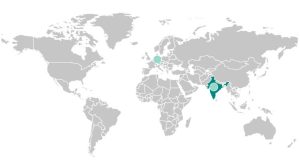The recruitment of international nursing staff from India in Germany is a topic of great importance. With the growing need for qualified healthcare professionals and the need to address demographic changes, many facilities are looking for solutions to expand their nursing workforce.
Indian nurses bring a wealth of experience, excellent skills and cultural diversity that can enrich the healthcare system in Germany. In this article we look at the process of hiring Indian nursing staff in Germany and highlight important aspects and challenges of this process. Let’s dive in!
Table of contents
- How do you hire international nurses from India in Germany?
- Requirements and requirements for hiring nursing staff from India in Germany
- The recognition process: How to recognize an Indian nurse in Germany
- Language requirements and integration: How to successfully integrate Indian nurses into the German healthcare system
- Recruitment methods and strategies for hiring Indian nurses in Germany
- Cultural sensitivity and collaboration: How to create an inclusive work environment for Indian nurses
- Successful integration and long-term retention of Indian nurses in Germany
- postprocessing

How to Hire International Nurses from India in Germany?
There is a high demand for qualified nursing staff in Germany and more and more hospitals and nursing facilities are looking for opportunities to recruit international specialists. “A growing number of German employers are particularly interested in nurses from India.” Hiring international nurses can bring many “benefits,” including expanding the talent pool, promoting cultural diversity, and “providing a better understanding of various medical practices “.
If you want to hire international nurses from India in Germany, there are a few important aspects you need to consider. First, it is important to ensure that your organization has an appropriate recruiting process in place to identify qualified applicants. This may include publishing your job advertisements in relevant Indian trade magazines or online platforms. In addition to activation marketing efforts, it is advisable to partner with Indian nursing schools or universities to raise awareness of potential candidates.
If you want a stress-free recruitment process, you can contact the international nursing candidates recruitment agency in Germany , which will handle all the processes for you in a streamlined manner. Globeriaglobal is an international recruitment agency based in Magdeburg, Germany , providing first-class recruitment services for international candidates, where quality and qualifications are guaranteed for every candidate hired.
It can also be helpful to build a network of Indian nurses in Germany to get first-hand recommendations and information. A good way to appeal to international nurses from India is to give them clear information about the requirements and benefits of working in Germany. “This can help address any challenges and uncertainties they may face.” Additionally, it is important to familiarize yourself with the legal regulations governing the employment of foreign workers in Germany. This includes issues such as the recognition of qualifications, work permits and other administrative processes.
A good way to get information and support in this area is to contact local employment centers or other relevant bodies. Overall, hiring international nurses from India in Germany offers “a great opportunity to attract qualified professionals” while promoting diversity and cultural competence in German hospitals and care facilities. With proper preparation and an effective hiring process, employers can make the process seamless and meet both their needs and the needs of caregivers.

Requirements for hiring nurses from India in Germany
- If you want to hire nurses from India in Germany, certain qualifications and requirements must be met. These must be taken into account by both applicants and employers in order to ensure smooth integration and a successful career start.
- In order to be able to work “as a nurse” from India in “Germany”, certain qualifications and certifications must be “proven”. This includes a completed nursing examination, which is recognized in India, as well as proof of language skills in German. The German language is crucial in order to be able to communicate effectively with patients, colleagues and doctors. The level of language skills is usually proven by passing the TestDaF or a comparable German test. A good knowledge of German is required, especially in the areas of medical terms and patient communication.
- The medical knowledge and skills should of course also correspond to the requirements in Germany. Therefore, it is important that nurses from India have in-depth knowledge and experience in nursing. Employers should check relevant certificates and references to ensure candidates have the required medical skills.
- Another important aspect is the recognition of foreign study and work certificates. In order to receive a work permit, the foreign qualification must be recognized by the Federal Office of Health and Social Affairs (BGG). It is advisable to start this process early to avoid delays.
- There are also requirements for employers that must be taken into account. You must submit an official job offer that contains the exact working conditions, employment contract and compensation. In addition, employers must demonstrate that they have the necessary resources and “working conditions” to ensure the “successful integration” of foreign nurses.
- Overall, hiring nurses from India in Germany is a complex task that requires careful planning and organization. If all requirements and requirements are met, international nursing staff can be a valuable asset to the German healthcare system.
- You can get in touch with GloberiaGlobal who have extensive experience in providing international recruitment services which makes them part and you can count on their experience in international recruitment from abroad.
The Recognition Process: How to Certify an Indian Nurse in Germany
The need for qualified nursing staff in Germany is increasing and many hospitals are looking for ways to recruit international applicants. A popular source for talented nurses is India. But how does the recognition process for Indian nursing staff work in Germany?
The recognition process for foreign nursing staff in Germany can be complex, but can be completed successfully with the right preparation and support.
Here are some important steps to hire an Indian nurse in Germany:
1. Verification of qualifications: First, the employer should verify the qualifications and experience of the Indian nurse. This can be done by comparing the Indian training with the German requirements. It is important to ensure that the applicant’s training and experience “meets the requirements” of the German health authorities.
2. Language Skills: Another important aspect when hiring an Indian nurse is language skills. Since German is the main language in the German healthcare system, applicants must have good knowledge of German. As a rule, the applicant is required to submit a language certificate, such as the TestDaF, to prove their German language skills. It is important to note that each application process can be individual, depending on the specific requirements of the employer, the country and the respective professional association. It is advisable to contact the responsible authorities at an early stage and get support from experts, for example a recognition body. With proper planning and preparation, an Indian nurse can successfully become certified in Germany and enjoy a rewarding career in the German healthcare industry.
| Excellent qualifications | High level of language skills (B1/B2) |
| Experiences in healthcare | Successful recognition process |
The table shows the crucial success factors when hiring an Indian nurse. A combination of qualified specialist knowledge and good language skills is essential for the successful completion of the recognition process. With these qualifications an Indian nurse can be a valuable asset to both employers and patients.
Language requirements and integration: How to successfully integrate Indian nurses into the German healthcare system?
Hiring international nurses, especially from countries like India, could well be a difficult path for the German “healthcare machine”. With regard to the successful integration of Indian “nurses” into the “German healthcare machinery”, this is a selection of language necessities and suggestions that can facilitate a smooth transition.
1. Language requirements for Indian nurses in Germany In order to work as a nurse in Germany, it is important that Indian nurses have a solid knowledge of German. In order to be able to communicate successfully with patients, colleagues and doctors, they should have general language skills as well as a command of medical vocabulary. It is advisable to clearly define the language requirements before hiring and provide relevant evidence, such as: B. language certificates. You can learn the German language before you arrive in Germany through language preparation courses or e-learning platforms.
2. Integration into the German healthcare system In order to successfully integrate Indian nursing staff into the German healthcare system, it is important to familiarize them with German work processes, laws and the cultural context.
Here are some approaches that can help with integration: –
Mentoring programs: By appointing an “experienced mentor”, Indian nurses can gain insight into how the German healthcare system works and find their way more quickly in their new work environment.
Introductory courses: Special introductory courses or training courses can help Indian nurses familiarize themselves with the requirements and processes of the German healthcare system. These courses should cover both practical and theoretical content.
Networking: The opportunity to network with other Indian nurses or healthcare colleagues can ease the integration process. This can be achieved by participating in specialist events, workshops or online forums.
Cultural Awareness: Since Indian nurses come from different cultural backgrounds, it is important to prepare them for cultural differences in the work environment. Training on intercultural communication and awareness-raising can be helpful here. In summary, the “successful integration of Indian nursing staff into the German healthcare system” is a “combination of language requirements and necessary integration measures”. The willingness to provide support and the use of suitable funding programs help to make optimal use of the potential and professional skills of these international specialists and ensure their successful integration into the German healthcare system.
Recruitment methods and strategies for hiring nurses from India in Germany
There is a “shortage of qualified” nursing staff in Germany and more and more hospitals are thinking about hiring international specialists from countries like India. Recruiting nursing staff from “India” can be an effective “solution to cover staffing needs” in German medical facilities.
But what’s the best way to do this? In this section, we will discuss various recruitment methods and strategies that can be used for successfully hiring nurses from India in Germany.
1. Identification of “suitable” candidates: In order to find “qualified” nursing staff from India, German hospitals can either carry out their own recruiting processes or rely on cooperation with personnel agencies or online job exchanges. When looking for suitable candidates, factors such as education, professional experience, knowledge of German and cultural adaptability play a major role. A comprehensive and meaningful job description text can help to appeal to potential applicants and make the application process more efficient.
2. Integration and support: Successful recruitment of nurses from India requires careful planning and organization of integration and support measures. This includes linguistic support, orientation about the German healthcare system and cultural awareness. A structured induction program that helps new “employees” find their way in their new working environment and familiarize themselves with everyday German work is of great importance. In addition, mentor or buddy programs can be used to make it easier to get started in everyday German working life.
The selection of suitable candidates and support with integration are crucial factors for a successful recruitment process. With the right strategies, hospitals in Germany can benefit from international expertise and close the gap in nursing staff.
Cultural Sensitivity and Collaboration: How to Create an Inclusive Work Environment for Indian Nurses
In a “globalized world,” it is not uncommon for different cultures to meet and work together. This also applies to the “medical industry”, especially in the area of nursing. More and more international nurses from countries like India are coming to Germany to work in German hospitals. The recruitment and integration of these nurses requires cultural sensitivity and an inclusive work environment.
In order to create an integrative working environment for Indian nurses in Germany, a basic understanding of Indian culture and traditions is first required. India is a country with a “diverse culture, different languages and religious beliefs”. It is important that German hospitals and their employees are aware of this “diversity” and deal sensitively with “cultural” differences.
A first step is to warmly welcome the new Indian nurses and give them a comprehensive introduction to German work culture. This can be done, for example, through a welcome package that contains information about the German healthcare system, hospital policies and employee expectations.
In addition, training and workshops should be offered to help Indian nurses familiarize themselves with German working practices. Another important component in creating an inclusive working environment is promoting intercultural exchange and collaboration.
This can be achieved through “regular team meetings, intercultural awareness training and the establishment of intercultural exchange programs.” Indian nurses should be encouraged to share their knowledge and experiences with German colleagues, while German employees should have the opportunity to learn more about Indian culture and traditions. In summary, the recruitment and integration of Indian nursing staff in Germany requires cultural sensitivity and an integrative working environment.
Hospitals must be aware that each culture has “its own norms and values” and that these should be respected and valued. Through a comprehensive introduction to German work culture, intercultural exchange and “regular training,” hospitals can “ensure” that Indian nurses feel welcome and integrated in Germany.
Benefits of an Inclusive Work Environment for Indian Nurses:
- Increased employee satisfaction and motivation.
- Better collaboration and teamwork.
- Better understanding and acceptance of different cultures.
- More effective communication.
- Lower risk of misunderstandings and conflicts.
- Improved quality of patient care through cultural competency.
Indian nurses in Germany – an enrichment for the German healthcare system:
| Advantages | Examples |
|---|---|
| Cultural exchange | Exchange about treatment methods and care techniques |
| Experience holistic medicine | Inclusion of “alternative healing methods”. |
| Diverse language skills | Communicating with patients from different cultures |
| Flexibility and adaptability | Ability to work in various work environments |
The recruitment and integration of Indian nursing staff in “Germany” can be child’s play for everyone involved. By being culturally sensitive and creating an inclusive work environment, hospitals can create a diverse and enriching work environment, while Indian nurses can bring their skills and experience to the German healthcare system. It is the responsibility of German hospitals to ensure that Indian nurses feel welcome and valued while benefiting from their cultural diversity and expertise.

Successful integration and long-term retention of Indian nursing staff in Germany
Hiring international nurses from India in Germany is a “strategic decision that hospitals and care facilities are making to meet the increasing demand” for qualified nursing staff. However, successful integration and long-term retention of these “Indian nurses” in Germany requires careful planning, effective communication and the provision of appropriate support and resources.
The first challenge is to streamline the recruitment process and ensure that the right steps are taken to identify and recruit qualified Indian nurses. This can be achieved by working with specialist recruitment agencies that have experience and expertise in international nursing recruitment. These agencies can assist in conducting interviews, checking references, and verifying applicants’ qualifications to ensure that only qualified and experienced nurses are selected.
Once hired, it is important to give Indian nurses a comprehensive introduction to the “German healthcare system” and work culture. This can be achieved by “providing training and orientation programs that will help them become familiar with the “national standards” of care and facilitate their cultural adaptation.
An open and communicative “work environment” where Indian nurses can have their “questions and concerns” addressed is also “very important”. Providing mentors and contacts can help them receive support and feel valued. Long-term retention of Indian nurses can be improved by providing development opportunities and career advancement. This can be achieved by providing training, development and advancement opportunities.
With the opportunity to develop professionally and improve their skills, Indian nurses become motivated and loyal to the employer. In summary, careful planning, good communication and “providing appropriate support” are required
By streamlining the hiring process, providing comprehensive training and support, and creating development opportunities, hospitals and care facilities can retain talented and qualified Indian nurses on their staff for the long term. This will not only help meet the need for nursing staff, but also promote cultural diversity and mutual understanding in the healthcare industry.
Summary/Conclusion
In summary, hiring international nursing staff from India represents a promising solution to the “ever-growing need for nursing care” in Germany. From their professional qualifications to the cultural “experiences” they bring with them, the German healthcare system benefits. I am enormously pleased about this enriching collaboration.
At the same time, however, it is important to be aware that the smooth integration of these nurses must occur at both an administrative and interpersonal level. A thorough understanding of the legal framework and the creation of a culturally sensitive working environment are “essential to fully exploit the potential of this global exchange”.
“By skillfully using international recruitment agencies that have expertise in this area, hospitals and care facilities can successfully recruit qualified individuals from India.” Working with these agencies offers the advantage of professional support throughout the entire process – from finding suitable candidates through to support with visa and work permit procedures.
Finally, it is important to emphasize that hiring international nurses from India “not only” represents a solution to the nursing shortage, but also “offers an opportunity to promote intercultural competencies and” strengthen international exchanges in healthcare.
By recognizing the diversity of experiences and skills from other countries and integrating them into our work environment, we can ensure better care and health well-being for all patients.



